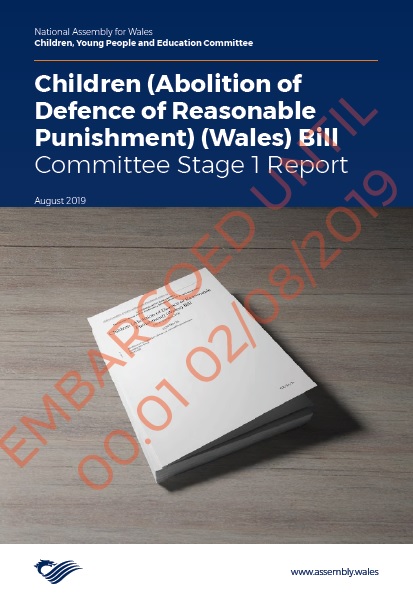ADSS Cymru welcomes today's announcement by The National Assembly for Wales’s Children, Young People and Education (CYPE) Committee of its support for the proposal to remove the defence of reasonable punishment in Welsh law.
The Stage 1 Report on the Children (Abolition of Defence of Reasonable Punishment) (Wales) Bill published today, follows the Committee’s Stage 1 scrutiny of the Bill, part of a four-stage legislative process.
The report presents evidence for and against the Bill and makes recommendations about actions the CYPE Committee believes the Welsh Government should take.
In May 2019, ADSS Cymru's then-Chair of the All Wales Heads of Children's Services, Sally Jenkins gave evidence supporting the bill jointly alongside the Welsh Local Government Association.
The evidence noted:
"As organisations that represent the leaders of local government in Wales, all our members advocate, on a daily basis, the need for preventative or targeted interventions to assist families who may require additional support to implement positive parenting techniques. We believe that these supportive interventions have enabled a shift in culture and has allowed such families to develop the confidence and knowledge to manage difficult child behaviors in a controlled way without resorting to physical punishment. We believe that while the removal of the defence of ‘reasonable punishment’ will not change parenting practice immediately, it will help to accelerate a cultural change that is already taking place in Wales and will continue to do so over time.
"The Bill, introduced by Welsh Government on 25 March 2019, proposes to abolish the common law defence of reasonable punishment for any parent (or any adult acting in a parental capacity) accused of assault or battery against a child. If passed, this law will mean that it would no longer be legal for children in Wales to be physically punished."
In a press release issued today alongside the Stage 1 Report, the Welsh Assembly announced:
In considering the Bill’s general principles, the Committee’s role is to inform the National Assembly’s decision on whether the proposed legislation should progress to the next stage in becoming law. The Bill will need to go through several further stages before it would become law, and the final decision will rest with all sixty Assembly Members. The Committee is today reporting on the evidence for and against the Bill and making recommendations about actions it believes the Welsh Government should take.
The Committee’s recommendations
A majority of the Committee’s members support the Welsh Government’s Bill. However, the Committee is recommending two things it says are vital if this Bill is to benefit children and their families:
- A wide-ranging awareness-raising campaign about what this Bill will do is essential. The Committee believes this is fundamental to the success of this legislation and, therefore, there must be a legal duty on the Welsh Government to deliver this.
- There must be universal support available to parents across Wales. Much more needs to be done to help all families with the inevitable challenges that parenting brings.
Suzy Davies AM and Janet Finch-Saunders AM do not support the Bill.
Hearing all sides of the debate
The Committee held a public consultation and committee evidence sessions to enable views on both sides of the debate to be presented. The consultation received 650 responses - 562 from individuals responding in a personal capacity, 29 responding in a professional capacity and 59 responses from organisations. In addition to the Committee’s own analysis, the Office for National Statistics was also commissioned to undertake independent data science analysis of the responses, to identify the main issues raised by respondents.
Launching the report on behalf of the Committee, Chair, Lynne Neagle AM said:
“As a Committee, we fully recognise that there are strongly held views on both sides of the debate about whether this Welsh Government Bill should become law. We thank all those who submitted evidence setting out their views and those parents and representatives of organisations who have come to speak directly with us. We have received a lot of detailed information, heard a wide range of opinions and given detailed consideration to the breadth of evidence available to us.
“An important part of our work has been to hear from those working on the front line with responsibility for protecting children. Those we have spoken to include the Police, the Crown Prosecution Service, Social Services, teacher representatives and a wide range of health professionals including GPs, nurses, health visitors, paediatricians and psychiatrists.
“Without exception, these front line professionals have told us that this Bill will improve their ability to protect children living in Wales because it will make the law clear. We have been told that, as a result, this will help them better protect children. Professionals also told us that this Bill will make a significant difference because it provides a clear line for them and, importantly, a clear boundary that parents, children and the wider public can clearly understand.
“On balance, the majority of our Committee believes there is a strong argument that this Bill will reduce the risk of potential harm to children and young people.
“Following careful consideration of this Welsh Government Bill, today we are setting out the detailed evidence underpinning our conclusion and we have outlined the recommendations we think are needed to strengthen the legislation.”
The Stage 1 debate is scheduled to take place in Plenary on Tuesday 17 September 2019. During this debate, all Assembly Members will have an opportunity to discuss the Bill. After the debate, Assembly Members will be asked to vote on whether the Bill should progress to the next stage.

